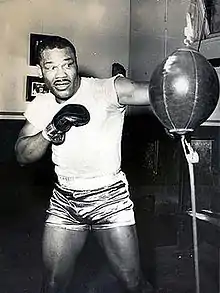Joe Bygraves | |
|---|---|
 | |
| Born | 25 May 1931 |
| Died | 16 January 2012 (aged 80) |
| Nationality | |
| Statistics | |
| Weight(s) | Heavyweight |
| Height | 185 cm (6 ft 1 in) |
| Stance | Orthodox |
| Boxing record | |
| Total fights | 72 |
| Wins | 42 |
| Wins by KO | 22 |
| Losses | 28 |
| Draws | 2 |
| No contests | 0 |
Joe Bygraves (26 May 1931 – 16 January 2012) was a British heavyweight boxer. Bygraves turned professional in 1953, and after an impressive early career he successfully challenged Kitione Lave for the vacant Commonwealth Heavyweight belt in 1956. Bygraves defended the title on three occasions, knocking-out Henry Cooper and holding Dick Richardson to a draw before losing the championship to Joe Erskine. Bygraves immigrated to Britain as a youth but did not take British citizenship until the end of his fighting career in 1967.
Boxing career
Bygraves was born into a large family of 11 siblings, in Kingston, Jamaica in 1931.[1] He immigrated to Britain at the age of 15 and settled in Liverpool. He began his amateur career at the age of 17 first as a light heavyweight and then moving up to the heavyweight division.[1] He was successful at both weights, winning amateur county titles.[1]
Bygraves turned professional in 1953, managed by Johnny Campbell,[2] his first paid encounter was against Don Maxwell on 12 February. The fight lasted just 65 seconds, Bygraves winning by knockout. Bygraves won the next five fights, six and eight round encounters, mainly on points decisions, but he was stopped for the first time in his professional career by Joe Crickmar in a novice heavyweight competition. Despite the loss Bygraves' career continued to impress and by the end of 1954 he had accumulated 24 wins to only 4 losses. His final fight of 1954 was a loss by points decision to Polly Smith, a fighter he had beaten just two months prior.
Bygraves began 1955 in the same way he ended 1954, with a loss. After several months away from the ring, Bygraves returned to face rising British fighter Henry Cooper. The eight round scheduled fight went the distance, with Cooper given the decision.[3] Bygraves followed this with a string of four wins, including a victory over Tongan Kitione Lave, and his first fight outside the United Kingdom, a technical knockout of Hugo Salfeld in Germany. Bygraves then travelled to Italy, for a string of three fights. He lost the first to European Boxing Champion Franco Cavicchi when he was disqualified in the eighth round, but then took two victories when he beat Aldo Pellegrini in Milan and Uber Bacilieri in Bologna.
On 24 February 1956, Bygraves travelled to Sweden to face the then unbeaten Ingemar Johansson. The eight round contest ended in a points decision for Johansson.[4] Two months later, Bygraves was back in a British ring, facing ex-British heavyweight champion Jack Gardner, whom he stopped in the second round. A second successive win, this time against Marcel Limage in Cardiff, gave Bygraves a shot at the vacant Commonwealth Heavyweight title. Despite living in Britain for near ten years, Bygraves was not allowed to fight for the British titles as he was not born there. His opponent for the title fight was Kitione Lave, who he had beaten the previous year. Held at the Empire Pool in London on 26 June 1956, the match was scheduled for 15 rounds, the first time Bygraves had contested a fight of this length. The bout went the distance, with the judges declaring Bygraves the victor, and new Commonwealth champion.
Bygraves lost his next fight to American Wayne Bethea, and this was followed by a win over another ex-British Heavyweight champion, Johnny Williams. His first title defence was on 19 February 1957, against Henry Cooper. The fight is regarded as one of Bygraves best of his career, stopping Cooper via technical knockout in the ninth round.[1] Just three months later, Bygraves defended the Commonwealth belt again, on this occasion the challenger was Welshman Dick Richardson. The fight ended in a draw, and as holder Bygraves retained his title.[5] His third and final defence of his Commonwealth title again came from Wales, this time against Joe Erskine. As with the Richardson fight, the bout went the full fifteen rounds, but on this occasion the decision went to Erskine, stripping Bygraves of his title.
After the Erskine fight, Bygraves struggled for success, and in more and more fights he ended as the loser. He still faced some notable fighters included losses to Americans Willie Pastrano and Zora Folley, and another failed attempt at Ingemar Johansson. One of his last wins was over Olympic gold medalist Franco De Piccoli in 1963, and in 1965 he failed to beat Canadian heavyweight champion George Chuvalo at the Albert Hall in London. His last recorded professional bout was against Hector Eduardo Corletti on 20 March 1967.
Professional boxing record
References
- 1 2 3 4 Brown, Leroy (12 February 2012). "Former boxing champion Joe Bygraves passes on". The Gleaner. Retrieved 15 April 2012.
- ↑ "Johnny Campbell - The man who put Birkenhead on the map". boxingbiographies.com. 31 December 2013. Archived from the original on 3 November 2013. Retrieved 1 January 2013.
- ↑ Samuel, John (1 May 2011). "Sir Henry Cooper obituary". The Guardian. Retrieved 15 April 2012.
- ↑ "Ingemar Johansson". The Telegraph. 1 February 2009. Retrieved 15 April 2012.
- ↑ Mee, Bob (16 July 1999). "Obituary: Dick Richardson". The Independent. Archived from the original on 9 June 2022. Retrieved 15 April 2012.
* Biography
- Boxing record for Joe Bygraves from BoxRec (registration required)
- Empire Title For Joe Bygraves 1956 British Pathe